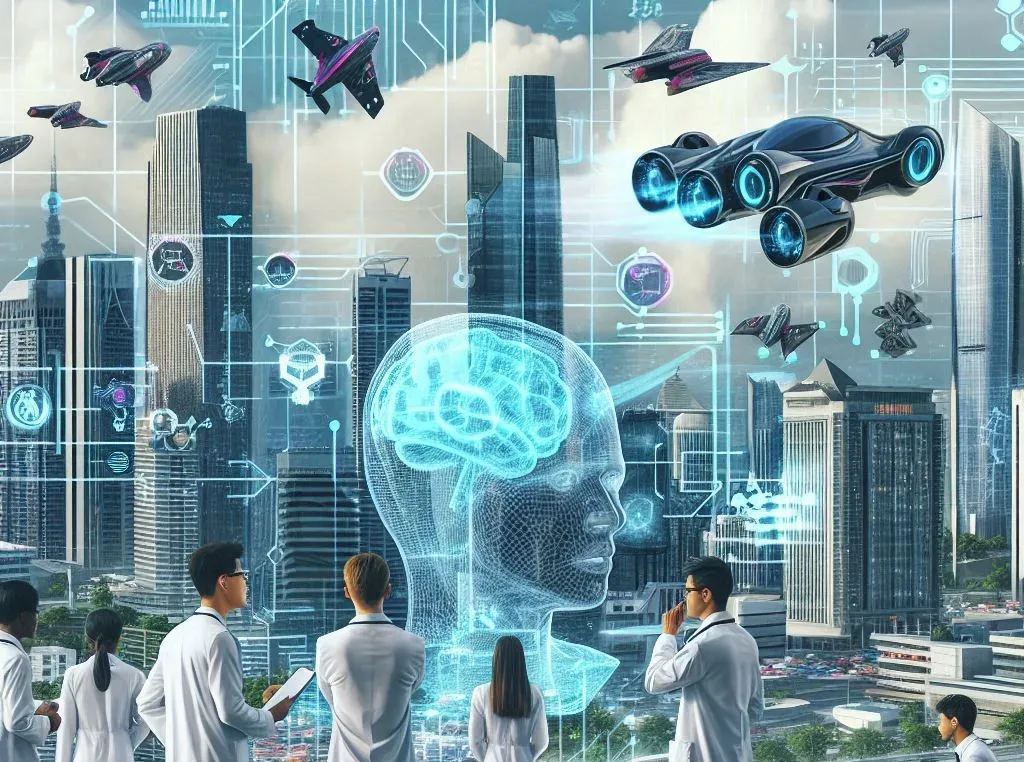In the rapidly evolving landscape of technology, few fields have captured the imagination and potential for transformative change quite like machine learning (ML). As we stand on the cusp of a new era, machine learning promises to revolutionize industries, reshape human-computer interaction, and solve some of the world’s most pressing challenges. This article delves into the future of machine learning, exploring its potential applications, emerging trends, and the profound impact it’s set to have on our daily lives and society as a whole.
The Evolution of Machine Learning
Machine learning, a subset of artificial intelligence (AI), has come a long way since its inception. From simple linear regression models to complex neural networks, the field has seen exponential growth in both capability and application. As we look to the future, several key developments are poised to drive machine learning to new heights:
- Increased Computing Power: The advent of quantum computing and continued advancements in GPU technology will enable more complex and powerful ML models.
- Big Data Explosion: With the proliferation of IoT devices and digital services, the sheer volume of data available for training ML models will continue to grow exponentially.
- Algorithmic Innovations: Researchers are constantly developing new algorithms and refining existing ones, pushing the boundaries of what’s possible in ML.
- Interdisciplinary Collaboration: The integration of ML with fields like neuroscience, psychology, and biology will lead to more sophisticated and human-like AI systems.
Emerging Trends in Machine Learning
As we peer into the future, several exciting trends are emerging that will shape the landscape of machine learning:
1. Explainable AI (XAI)
As ML models become more complex and are increasingly used in high-stakes decision-making processes, the need for transparency and interpretability grows. Explainable AI aims to make the decision-making process of ML models more understandable to humans. This will be crucial in areas like healthcare, finance, and criminal justice, where the reasoning behind a decision is as important as the decision itself.
Example: Imagine a future where a doctor can explain to a patient exactly how an AI-powered diagnostic system arrived at its conclusion, highlighting the specific factors in the patient’s medical history and test results that influenced the diagnosis.
2. Federated Learning
Privacy concerns are at the forefront of many discussions around AI and data usage. Federated learning offers a solution by allowing ML models to be trained on decentralized data without the need to store it in a central location. This approach will enable more personalized and privacy-preserving AI applications.
Example: A smartphone keyboard prediction algorithm could improve its accuracy by learning from users’ typing patterns without ever sending their personal data to a central server.
3. AutoML and AI-Assisted Machine Learning
As machine learning becomes more accessible, tools that automate the process of building and optimizing ML models (AutoML) will gain prominence. This democratization of ML will allow non-experts to harness its power across various domains.
Example: A small business owner with no technical background could use an AutoML platform to develop a customer churn prediction model, inputting their sales data and receiving a fully optimized model without needing to understand the intricacies of feature engineering or hyperparameter tuning.
4. Reinforcement Learning in Real-World Applications
While reinforcement learning has shown promise in simulated environments and games, its application to real-world problems will expand. From robotics to autonomous vehicles, reinforcement learning will enable AI systems to learn and adapt in complex, dynamic environments.
Example: Autonomous drones could use reinforcement learning to navigate through dense urban environments, adapting their flight patterns based on real-time data about weather conditions, obstacles, and air traffic.
5. Multimodal Learning
Future ML models will increasingly integrate data from multiple sources and types, including text, images, audio, and sensor data. This multimodal approach will lead to more robust and versatile AI systems capable of understanding and interacting with the world in ways that more closely mimic human perception.
Example: A smart home assistant could understand and respond to commands that combine voice, gesture, and context, such as “Turn on the lights in the room I’m pointing at, but make them dimmer than usual because I have a headache.”
Transformative Applications of Machine Learning
The future applications of machine learning are limited only by our imagination. Here are some areas where ML is poised to make significant impacts:
Healthcare and Medicine
Machine learning will revolutionize healthcare through personalized medicine, drug discovery, and early disease detection. AI-powered systems will analyze vast amounts of medical data to identify patterns and insights that humans might miss.
Example: A wearable device could continuously monitor a person’s vital signs and use ML algorithms to detect subtle changes that might indicate the early stages of a heart condition, alerting the user and their healthcare provider before symptoms become apparent.
Climate Change and Environmental Protection
ML models will play a crucial role in understanding and mitigating the effects of climate change. From optimizing renewable energy systems to predicting natural disasters, machine learning will be an essential tool in our fight against environmental challenges.
Example: Advanced ML models could analyze satellite imagery, weather patterns, and historical data to predict the likelihood and severity of wildfires, allowing for more effective prevention and response strategies.
Education and Personalized Learning
The future of education will be transformed by ML-powered adaptive learning systems that tailor educational content and approaches to individual students’ needs, learning styles, and progress.
Example: An AI tutor could analyze a student’s performance across various subjects, identify areas of strength and weakness, and dynamically adjust the curriculum to optimize learning outcomes, even suggesting real-world applications of concepts to increase engagement.
Transportation and Urban Planning
Machine learning will be at the heart of smart cities, optimizing traffic flow, reducing energy consumption, and improving public transportation systems.
Example: A city-wide ML system could analyze real-time data from traffic sensors, public transit usage, and weather forecasts to dynamically adjust traffic light timings, suggest alternate routes to drivers, and deploy additional buses or trains to meet changing demand.
Financial Services and Fraud Detection
ML algorithms will continue to evolve in their ability to detect fraudulent activities, assess credit risk, and provide personalized financial advice.
Example: A bank’s ML system could analyze a customer’s spending habits, income patterns, and life events to proactively offer personalized financial products or advice, such as suggesting a higher-yield savings account when it detects an increase in regular savings deposits.
Ethical Considerations and Challenges
As we embrace the potential of machine learning, we must also grapple with the ethical implications and challenges it presents:
- Bias and Fairness: Ensuring that ML models do not perpetuate or amplify existing societal biases will be crucial. Developing fair and unbiased AI systems will require diverse teams and careful consideration of training data and model design.
- Privacy and Data Protection: As ML systems become more pervasive, protecting individual privacy and ensuring responsible data usage will be paramount. Innovations in privacy-preserving ML techniques will be essential.
- Job Displacement: The automation of tasks through ML will likely lead to significant changes in the job market. Preparing the workforce for this shift and creating new opportunities will be a major societal challenge.
- Accountability and Regulation: Establishing clear guidelines and regulations for the development and deployment of ML systems, especially in high-stakes applications, will be necessary to ensure responsible innovation.
- Environmental Impact: The energy consumption of large-scale ML models is a growing concern. Developing more energy-efficient algorithms and hardware will be crucial for sustainable AI development.
Conclusion: The future of machine learning is bright and full of potential. As we continue to push the boundaries of what’s possible, we’ll see ML systems that are more intelligent, more adaptable, and more integrated into our daily lives than ever before. From healthcare to education, from environmental protection to urban planning, machine learning will play a pivotal role in shaping the world of tomorrow.
However, realizing this potential will require not just technological innovation, but also careful consideration of the ethical, social, and environmental implications of these powerful tools. As we embrace the future of machine learning, we must strive to create AI systems that are not only intelligent but also fair, transparent, and aligned with human values.
The journey ahead is exciting and challenging in equal measure. By fostering collaboration between technologists, policymakers, ethicists, and domain experts, we can harness the power of machine learning to create a future that is more efficient, more sustainable, and more equitable for all. As we stand on the brink of this new era, one thing is clear: the future of machine learning is not just about smarter machines, but about empowering humans to solve the world’s most pressing problems and unlock new realms of possibility.




